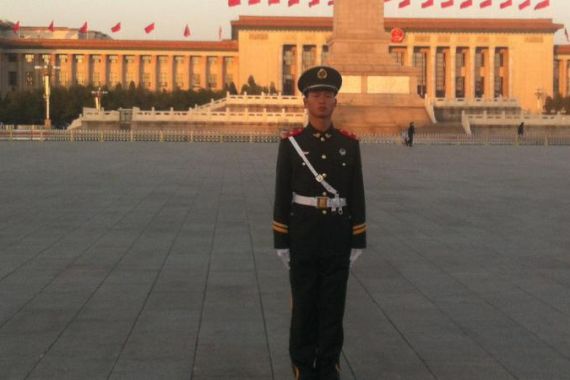Chinese transition – Life goes on
As China chose their new leaders, for the 1.2 billion population it was a normal day

In the days running up to China’s once-in-a-decade leadership transition, security levels in the capital are outstanding.
To get into the, normally open, Tiananmen Square, people have to form long queues to pass through security checks.
In front of the Forbidden City, it’s always been a main attraction for Chinese visiting the capital. Now ahead of the big event, there’s an added attraction of enormous flower arrangements for tourists to snap away at.
As we walked around the edge of the cordon, a petitioner appeared out of nowhere, trying to press a piece of paper into our hands – a desperate attempt to get publicity for his cause, which typically involves injustice at the hands of corrupt local officials in provinces far from the capital.
Our producer apologided to him and quickly moved us on. It would be complete folly, he said, to accept the piece of paper – uniformed and plain clothed police who were watching us like hawks would quickly pounce on us and the man would be bundled off, to a fate unknown, most likely back in the province he’d taken such pains to travel from.
The Chinese government is focused on pulling off their week-long event without any hitches or surprises.
It involves the stepping down of Hu Jintao as head of the Communist Party and the replacement of the all-important Politburo Standing Committee – a group of 9 men in who’s hands lie the fate of the country’s population of 1.3 billion.
The Chinese people are largely divorced from the whole process – without the power to vote.
Of much more interest, at least for educated netizens, is the US election which offered a stark contrast just a day ahead of China’s leadership transfer.
In the tense hours running up to Obama’s re-election, the impending result was the number one trending topic on Sina-Weibo – China’s version of Twitter. The site had 2 million searches for “US elections”.
But for the millions of Chinese living in rural towns and villages, neither event holds much relevance.
Their concerns are less about who is in charge of The Communist Party of China and more about what The Party plans to do to improve their lot.
Robert Kapp, Strategic Advisor for US-China Speciality Group, says, “success of over 30 years in China has been magnificent – 100s millions people are no longer desperately poor. But that success has bred its own enormous new problems.”
Petitioners coming to Beijing know those problems only too well. They know the new leadership is not going to bring any sudden changes and they know their voices are not being heard during this Congress.
The best they can hope for is The Party gradually puts into action its oft-repeated rhetoric of cracking down on corruption, cleaning up the environment and narrowing the gap between rich and poor.